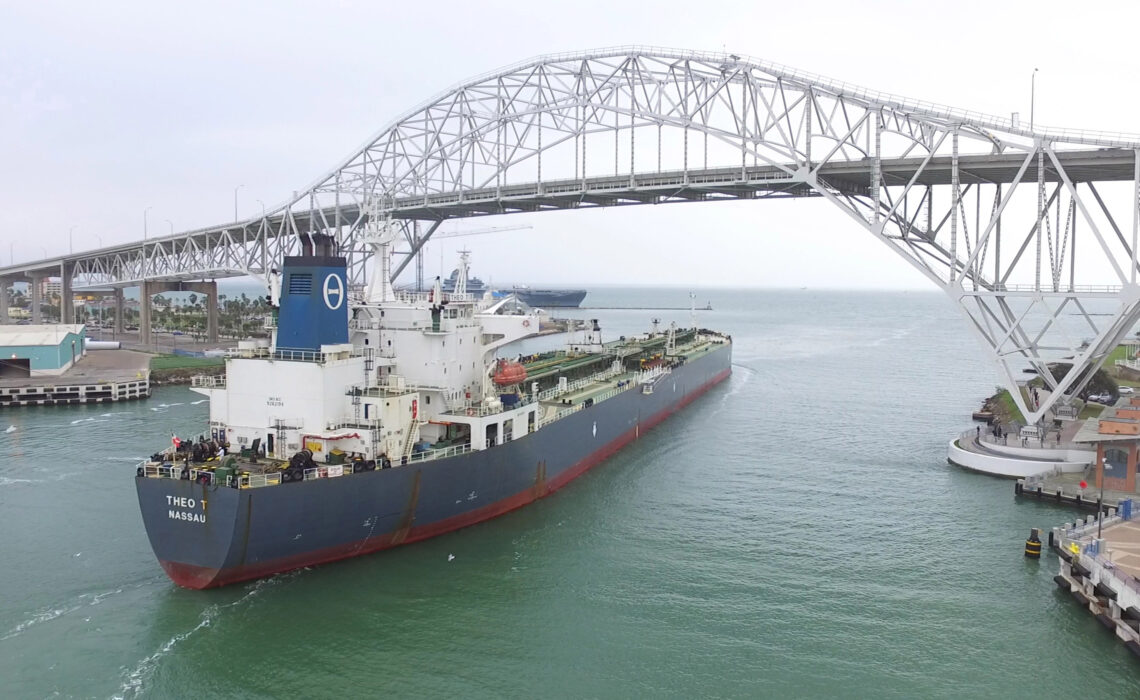
The Theo T heads to sea from the Port of Corpus Christi on Dec. 31, 2015, with the first export of crude oil in the U.S. since Congress lifted the ban Dec. 18. With a deeper, wider ship channel, the port will be able to handle bigger ships and increased traffic due to the lifting of the ban. Photo courtesy Port of Corpus Christi
The lifting of a 40-year ban on crude oil exports has poised Corpus Christi on the edge of an energy renaissance, despite the current drop in the price of oil per barrel, said Sean Strawbridge, chief operating officer of the Port of Corpus Christi.
“The American barrel is a safe, steady supply of oil for our geopolitical allies,” Strawbridge told Corpus Christi Business News. “That will continue to grow long term, although there are some short-term challenges related to the global supply and demand imbalance.”
The nation’s first export of crude oil left the Port of Corpus Christi on Dec. 31, just two weeks after Congress voted to lift the ban. Port officials had prepared for this day for years, adding dock space and storage as well as dredging and widening the channel for the bigger ships now being used for shipments.
Commissioners approved $115 million in revenue bonds last April to finance continuing improvement projects. Another $1 billion in capital improvements is slated during the next 10 years. Another $1 billion will be spent by the Texas Department of Transportation over the next five years to build a new bridge tall enough to allow bigger ships into the Corpus Christi Channel.
As the Theo T passed under the current Harbor Bridge, however, the price of that all-important crude oil was continuing to drop, reaching a new low of less than $30 a barrel. A year and a half ago, the price per barrel was $108. Recently it dropped again to $23 a barrel.
Coupled with the other energy companies exporting crude from the Port of Corpus Christi, the port reached a peak shipment in August 2014 of more than 750,000 barrels a day. Those shipments went to U.S. and Canadian refineries.
The type of crude being shipped from Corpus Christi is another plus, according to an analyst with RBN Energy LLC in Houston. A light, sweet crude, it is a better fit for refineries around the world. U.S. refineries are equipped for processing heavier, cheaper crude.
“That could make Corpus a major center of crude exports going forward,” wrote Housely Carr, an analyst with RBN in a recent research report.
Carr further predicted that low crude prices will spur foreign demand and lead to future reliance on U.S. exports by as much as 2 million barrels a day within the next five years.
Strawbridge predicts the world supply of crude will reach an equilibrium in the first two quarters of 2017. Whenever that happens — and it is inevitable, according to industry analysts — the Port of Corpus Christi and the companies leasing space at the port are ready.
NuStar Energy Inc., which shipped that first load of crude, said it has the capability of loading up to 400,000 barrels a day. NuStar plans to expand that capacity by more than 40 percent to 575,000 barrels a day.
“As a port, we have the infrastructure to support these trade flows,” Strawbridge said, referring to the ups and downs in the economy. “We can’t create infrastructure overnight. Although we feel the effects of short-term gyrations, we look at it from a long-term perspective.”
That long-term foresight has transformed the port over the past 90 years of its existence from a major cotton exporter to an import hub for oil to its current status as a center for outbound crude produced in the Eagle Ford shale play and, to a lesser degree, the Permian Basin shale play.
“Our proximity to the largest shell formations in the U.S., coupled with deep-water access and robust infrastructure, makes us ideally suited as a jumping-off point to serve not just other regions of the country, but other regions of the world,” Strawbridge said, pointing out that oil exports are not the only driving economic force in the Coastal Bend.
“We are seeing diversity in the industrial developments going on in the Corpus Christi area,” he said. “Not only are we seeing midstream refining, we are seeing foreign direct investment in chemical companies and iron ore-producing companies. There’s a lot of diversity.”
He cited three reasons for industrial growth in the area: air quality status with the Environmental Protection Agency; safe, steady and cost-effective supply of energy; and a steady and growing professional and trade craft labor force.
A fourth he added is on a more personal level.
“Corpus Christi is a great place to live,” he said. “And we’re hitting on all cylinders here. It’s a good time to be in Corpus Christi.”





